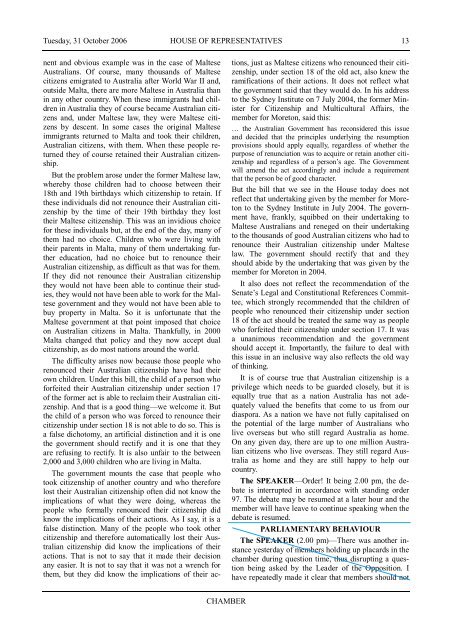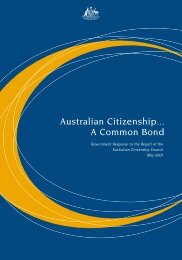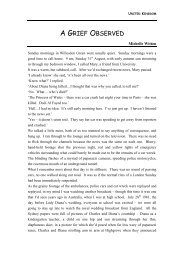HOUSE OF REPRESENTATIVES - The Southern Cross Group
HOUSE OF REPRESENTATIVES - The Southern Cross Group
HOUSE OF REPRESENTATIVES - The Southern Cross Group
Create successful ePaper yourself
Turn your PDF publications into a flip-book with our unique Google optimized e-Paper software.
Tuesday, 31 October 2006 <strong>HOUSE</strong> <strong>OF</strong> <strong>REPRESENTATIVES</strong> 13<br />
nent and obvious example was in the case of Maltese<br />
Australians. Of course, many thousands of Maltese<br />
citizens emigrated to Australia after World War II and,<br />
outside Malta, there are more Maltese in Australia than<br />
in any other country. When these immigrants had children<br />
in Australia they of course became Australian citizens<br />
and, under Maltese law, they were Maltese citizens<br />
by descent. In some cases the original Maltese<br />
immigrants returned to Malta and took their children,<br />
Australian citizens, with them. When these people returned<br />
they of course retained their Australian citizenship.<br />
But the problem arose under the former Maltese law,<br />
whereby those children had to choose between their<br />
18th and 19th birthdays which citizenship to retain. If<br />
these individuals did not renounce their Australian citizenship<br />
by the time of their 19th birthday they lost<br />
their Maltese citizenship. This was an invidious choice<br />
for these individuals but, at the end of the day, many of<br />
them had no choice. Children who were living with<br />
their parents in Malta, many of them undertaking further<br />
education, had no choice but to renounce their<br />
Australian citizenship, as difficult as that was for them.<br />
If they did not renounce their Australian citizenship<br />
they would not have been able to continue their studies,<br />
they would not have been able to work for the Maltese<br />
government and they would not have been able to<br />
buy property in Malta. So it is unfortunate that the<br />
Maltese government at that point imposed that choice<br />
on Australian citizens in Malta. Thankfully, in 2000<br />
Malta changed that policy and they now accept dual<br />
citizenship, as do most nations around the world.<br />
<strong>The</strong> difficulty arises now because those people who<br />
renounced their Australian citizenship have had their<br />
own children. Under this bill, the child of a person who<br />
forfeited their Australian citizenship under section 17<br />
of the former act is able to reclaim their Australian citizenship.<br />
And that is a good thing—we welcome it. But<br />
the child of a person who was forced to renounce their<br />
citizenship under section 18 is not able to do so. This is<br />
a false dichotomy, an artificial distinction and it is one<br />
the government should rectify and it is one that they<br />
are refusing to rectify. It is also unfair to the between<br />
2,000 and 3,000 children who are living in Malta.<br />
<strong>The</strong> government mounts the case that people who<br />
took citizenship of another country and who therefore<br />
lost their Australian citizenship often did not know the<br />
implications of what they were doing, whereas the<br />
people who formally renounced their citizenship did<br />
know the implications of their actions. As I say, it is a<br />
false distinction. Many of the people who took other<br />
citizenship and therefore automatically lost their Australian<br />
citizenship did know the implications of their<br />
actions. That is not to say that it made their decision<br />
any easier. It is not to say that it was not a wrench for<br />
them, but they did know the implications of their ac-<br />
CHAMBER<br />
tions, just as Maltese citizens who renounced their citizenship,<br />
under section 18 of the old act, also knew the<br />
ramifications of their actions. It does not reflect what<br />
the government said that they would do. In his address<br />
to the Sydney Institute on 7 July 2004, the former Minister<br />
for Citizenship and Multicultural Affairs, the<br />
member for Moreton, said this:<br />
… the Australian Government has reconsidered this issue<br />
and decided that the principles underlying the resumption<br />
provisions should apply equally, regardless of whether the<br />
purpose of renunciation was to acquire or retain another citizenship<br />
and regardless of a person’s age. <strong>The</strong> Government<br />
will amend the act accordingly and include a requirement<br />
that the person be of good character.<br />
But the bill that we see in the House today does not<br />
reflect that undertaking given by the member for Moreton<br />
to the Sydney Institute in July 2004. <strong>The</strong> government<br />
have, frankly, squibbed on their undertaking to<br />
Maltese Australians and reneged on their undertaking<br />
to the thousands of good Australian citizens who had to<br />
renounce their Australian citizenship under Maltese<br />
law. <strong>The</strong> government should rectify that and they<br />
should abide by the undertaking that was given by the<br />
member for Moreton in 2004.<br />
It also does not reflect the recommendation of the<br />
Senate’s Legal and Constitutional References Committee,<br />
which strongly recommended that the children of<br />
people who renounced their citizenship under section<br />
18 of the act should be treated the same way as people<br />
who forfeited their citizenship under section 17. It was<br />
a unanimous recommendation and the government<br />
should accept it. Importantly, the failure to deal with<br />
this issue in an inclusive way also reflects the old way<br />
of thinking.<br />
It is of course true that Australian citizenship is a<br />
privilege which needs to be guarded closely, but it is<br />
equally true that as a nation Australia has not adequately<br />
valued the benefits that come to us from our<br />
diaspora. As a nation we have not fully capitalised on<br />
the potential of the large number of Australians who<br />
live overseas but who still regard Australia as home.<br />
On any given day, there are up to one million Australian<br />
citizens who live overseas. <strong>The</strong>y still regard Australia<br />
as home and they are still happy to help our<br />
country.<br />
<strong>The</strong> SPEAKER—Order! It being 2.00 pm, the debate<br />
is interrupted in accordance with standing order<br />
97. <strong>The</strong> debate may be resumed at a later hour and the<br />
member will have leave to continue speaking when the<br />
debate is resumed.<br />
PARLIAMENTARY BEHAVIOUR<br />
<strong>The</strong> SPEAKER (2.00 pm)—<strong>The</strong>re was another instance<br />
yesterday of members holding up placards in the<br />
chamber during question time, thus disrupting a question<br />
being asked by the Leader of the Opposition. I<br />
have repeatedly made it clear that members should not




